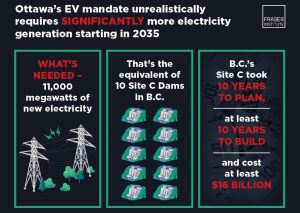
Ottawa’s EV mandate—and the increased demand for electricity—unrealistically requires the equivalent of 10 new mega hydro dams or 13 large natural gas plants nationwide within 11 years
BRITISH COLUMBIA —The federal government’s requirement that all new vehicles sold by 2035 be electric could increase Canada’s power demands by as much as 15.3 per cent, requiring the equivalent of 10 new mega hydro dams or 13 large natural gas plants to meet the increased power needs, finds a new study published today by the Fraser Institute, an independent, non-partisan Canadian public policy think-tank.
“Requiring all new vehicle sales in Canada to be electric in just 11 years means the provinces need to substantially increase their power generation capabilities, and adding the equivalent of 10 new mega dams or 13 new gas plants in such a short timeline isn’t realistic or feasible,” said G. Cornelis van Kooten, Fraser Institute senior fellow and author of Electric Vehicles and the Demand for Electricity.

The study measures how much additional electricity will be required in Canada and in three major provinces—Ontario, B.C. and Quebec—to charge electric vehicles once the federal government’s electric vehicle sales mandate comes into force.
For context, once Canada’s vehicle fleet is fully electric, it will require 10 new mega hydro dams (capable of producing 1,100 megawatts) nationwide, which is the size of British Columbia’s new Site C dam. It took approximately 10 years to plan and pass environmental regulations, and an additional decade to build. To date, Site C is expected to cost $16 billion.
Alternatively, the provinces could meet the increased electricity demand by building 13 large-scale natural gas plants nationwide capable of generating 500 megawatts of electricity each.
“Canadians need to know just how much additional electricity is going to be required in order to meet Ottawa’s electric vehicle mandate, because its impact on the provinces—and taxpayers and ratepayers—will be significant,” van Kooten said.
See full report here


